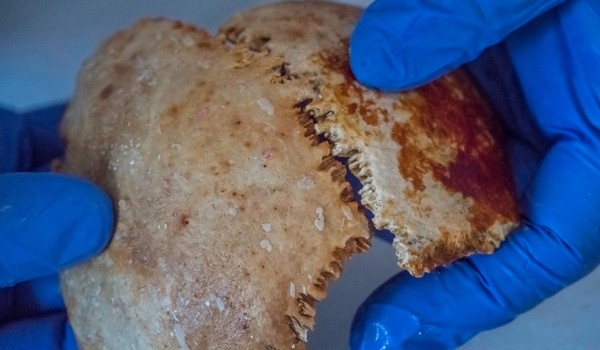By Ana Verayo, | September 20, 2016

Excavations in 2016 at the Antikythera Shipwreck produced a nearly intact skull, including cranial parietal bones.
The famous Greek shipwreck where the world's first analog computer (known as the Antikythera Mechanism) was discovered has given the world another important archaeological find; a 2,000-year-old human skeleton.
Like Us on Facebook
Scientists consider this find to be truly valuable since the bodies of shipwreck victims are typically eaten by marine creatures or are swept away by currents.
Decomposing human bodies underwater rarely survive for years. Researchers are excited about what the DNA of the 2,000-year-old corpse would reveal.
The well-preserved human remains include a partial skull, two arm bones, several ribs, and a couple of femurs that can all provide important clues about the unfortunate fate of the ship and its passengers.
According to ancient DNA expert Hannes Schroeder of the Denmark Museum of Natural History, at first glance, these skeletal remains appear to belong to a young adult male. Schroeder added that the skeletal remains do not even appear to be 2,000 years old.
Apart from these larger bones, the team also recovered some petrous bones that belong to the part of the skull behind the ear, which could hold DNA better than any other parts of the body like teeth.
The DNA recovery can yield crucial information about the victim such as his/her eye and hair color, including geographic origins and ancestry. The DNA testing is yet to be approved by the Greek government.
According to underwater archaeologist and co-director of the excavation project, Brendan Foley of the Woods Hole Oceanographic Institution, there is nothing else like this.
The Antikythera shipwreck was first discovered by divers during the 1900s, sitting 50 meters underwater. It is possibly the first shipwreck to be investigated by archaeologists.
One of the most famous artifacts from the site is the Antikythera Mechanism; an astronomical device used in the second B.C.E., which has been dubbed as the world's oldest computer.
It is considered evidence of the technological prowess of ancient Greeks. The device, which is made of 40 bronze cogs, tracks the movement of the stars and cycles of the solar system.
-
Use of Coronavirus Pandemic Drones Raises Privacy Concerns: Drones Spread Fear, Local Officials Say

-
Coronavirus Hampers The Delivery Of Lockheed Martin F-35 Stealth Fighters For 2020

-
Instagram Speeds Up Plans to Add Account Memorialization Feature Due to COVID-19 Deaths

-
NASA: Perseverance Plans to Bring 'Mars Rock' to Earth in 2031

-
600 Dead And 3,000 In The Hospital as Iranians Believed Drinking High-Concentrations of Alcohol Can Cure The Coronavirus

-
600 Dead And 3,000 In The Hospital as Iranians Believed Drinking High-Concentrations of Alcohol Can Cure The Coronavirus

-
COVID-19: Doctors, Nurses Use Virtual Reality to Learn New Skills in Treating Coronavirus Patients







